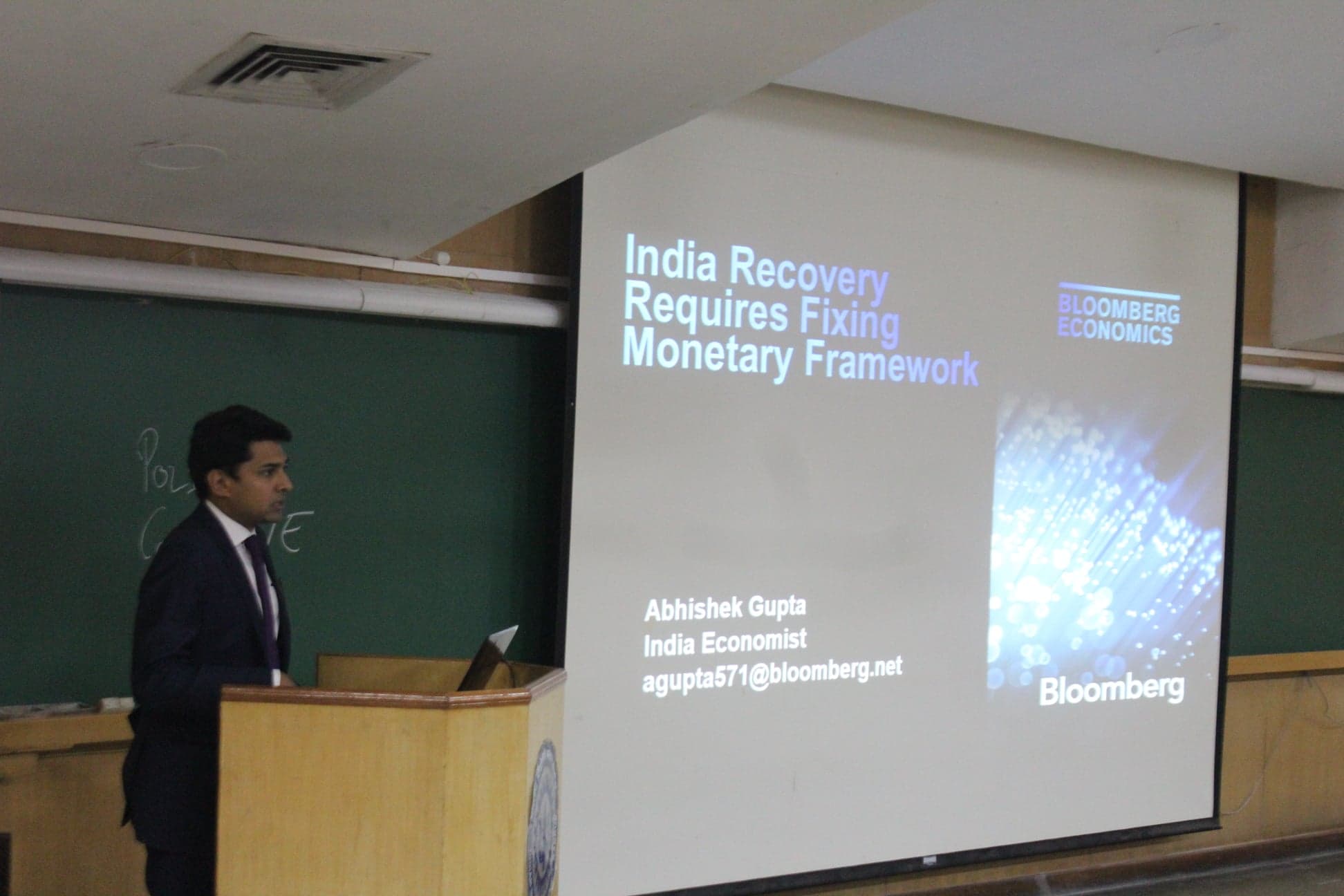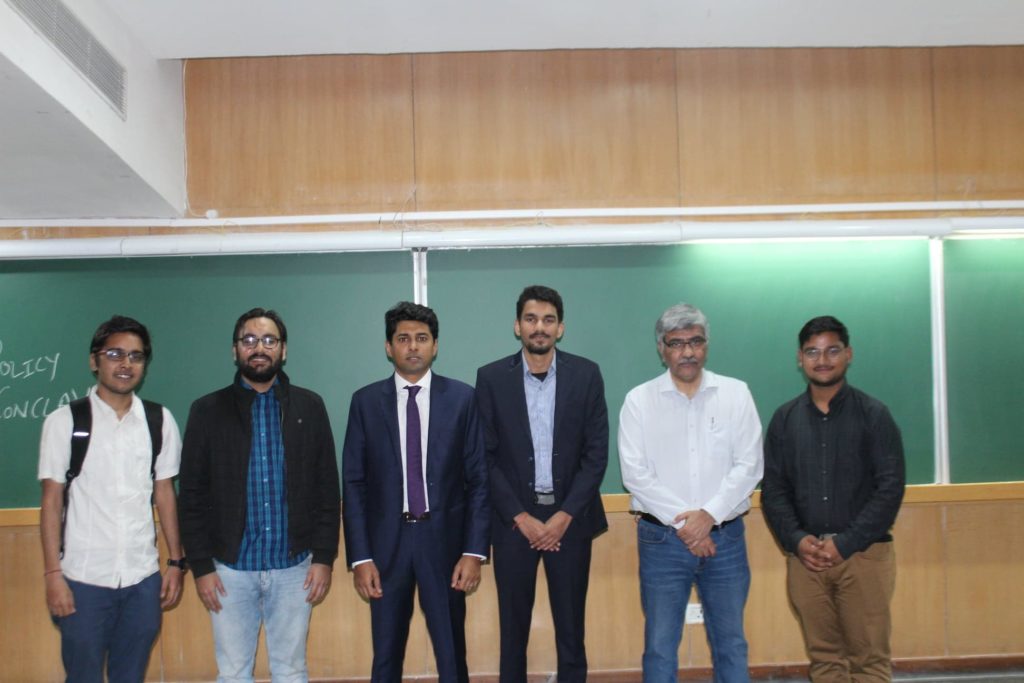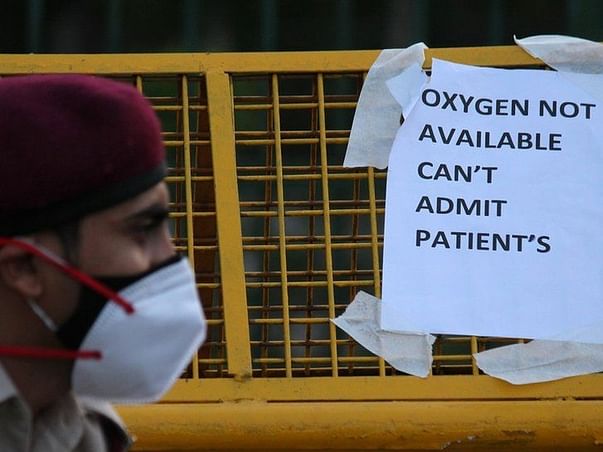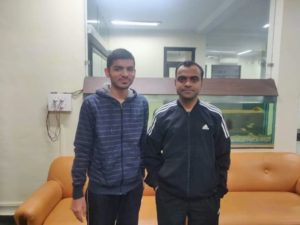Mr. Abhishek Gupta, the Chief India Economist at Bloomberg was invited to our campus as a part of the Policy Conclave 2020 organized by the Students’ Opinion Society, aiming to promote policy research on campus. Vox had the chance to interview him. Here is an overview of the conversation.
Sir, can you please describe the aspects of your job at Bloomberg as the Chief India Economist?
I am Abhishek Gupta, and I am the Chief India Economist at Bloomberg. What the role involves is essentially observing and analyzing the macro-economic data to help investors, i.e. making it easier for the investors to make sense of the Indian macroeconomic landscape. So, on a regular basis, I would look at all new incoming data-points namely inflation, GDP growth, unemployment, currency movements etc. and then forecast through the help of these data-points. Also, we deep dive into the policies impacting these macroeconomic variables.
So, previously you also worked at Bank of America Merrill Lynch. How do you compare the two jobs – one at an American bank, and the other as an Indian economic analyst at Bloomberg?
Even in the previous one, I was an Indian economist. I was working from Mumbai. The difference was that in Merrill Lynch, I was at the junior level. I was supporting the senior economist there. After doing that for a few years, I got an opportunity in Bloomberg for a lead economist, so I graduated into a lead one. As a junior economist, you can learn much, you gain knowledge from your senior, you can wonder about interesting policy topics that investors might care for. It helps you to train yourself to become an independent economist.
In my role at Bloomberg, obviously there’s greater responsibility too, which comes with the role because you are now in charge of the team. As a junior, you don’t have to do a lot of ideation, but now I have to ideate and become creative as I can concentrate on interesting research ideas and then execute those ideas. It’s a very innovative role.
Coming to the Indian economy, India’s GDP growth in the previous quarter was just 4.7%. But recently, our Hon’ble Finance Minister, Ms. Nirmala Sitharaman stated that “If the ship is steady and moving forward, then everything’s well” implying that even if the GDP growth is stable at a lower value, it is a good sign for the economy. Do you think that currently, India is going through an economic slowdown? How is the new budget going to help in tackling this situation?
There are two interesting data-points released recently. A lot of people just focus on the 4.7% GDP Growth rate in the December quarter. In my point of view, the more interesting inference was what the trend was pointing towards. Initially, what many people thought was that the growth rate has slightly gone up, so the economy has started recovering.
But that is not what the true picture is; if you might know, the numbers for the September quarter were revised upwards and since that was revised upwards, what this tells you is that the downtrend is still continuing which is the most worrying sign. The weak slowdown that the economy has been experiencing for the last many quarters and a few years shows that the economy needs more policy support.
So, from that perspective, if you look at the latest budget, it doesn’t do justice to the economy; because the fiscal situation is going to be even more contractionary, as the government is saying that it wants to reduce the fiscal deficit. But on the monetary side, there’s some incoming data support. That balances a little, but overall, the recovery would be slow at best. Another influence is of the global situation, where growth has become stagnant because of the coronavirus spread and fear. Although the Indian economy has been fairly stable with respect to this issue, it would still have some slight impact.
Overall, we need policy stimulus, to ensure that the economy does not slip further into a deeper slowdown.
Do you have any advice for the budding economists at IIT Kanpur, the ones who have taken engineering but are more interested in economics now?
I guess that’s an independent decision. More often than not, it’s your passion which leads you to a new field. Once you get there, it’s the combination of your passion, dedication, and motivation which leads you beyond. Coming to the engineering and economics point, if you have a strong mathematical background, it would only help you get there faster. Even today the way economics is taught, the catch-up time for an engineer would be a lot lesser than say, a person with a humanities background.
Lastly, how was your experience in IIT-K, and considering Policy Conclave, do you have any suggestions for the next year to improve the overall learning impact?
It was my first time at IIT Kanpur; it’s a lovely campus. One thing that I’d recommend for the Policy Enclave in the future years is to involve the faculty more. I noticed that the event was completely student-driven, which on one note signifies how much students can operate and achieve on their own but on the other hand, if the faculty gets involved, they might be able to put in their own positive and experienced views in the event organization. This might also result positively in a way that the output and learning from these events could be incorporated directly into the course curriculum and much wider economic discussions and debates might occur in the classrooms itself, which would bring a very constructive impact on the students.
Credits- Devansh Parmar, Ankur Banga













